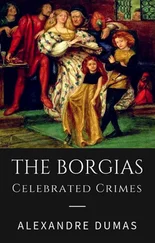Receiving no reply to his letter, and denied a personal interview with Cesare, Vitelli could but guess what Cesare intended to do next. Machiavelli was also kept in the dark. ‘I have not tried to speak to the Duke, having nothing new to tell him,’ he reported to Florence, ‘and the same things would bore him; you must realise that he talks to nobody other than three or four of his ministers and various foreigners who are obliged to deal with him about important matters and he does not come out of his study until late at night; and so there is no opportunity to speak to him except when an audience has been appointed.
‘Besides,’ continued Machiavelli, ‘he is very secretive. I do not believe that what he is going to do is known to anyone other than himself. His secretaries have told me often that he does not reveal his plans until they are ready to be carried out. So I beg your Lordships will excuse me and not put it down to my negligence if I do not satisfy your Lordships with information, because most of the time I do not even satisfy myself.’
So Machiavelli could not by any means discover what Cesare intended to do next. Then, just before Christmas, there was news; Cesare had summoned all the French officers in his army to come to see him and had told them that he no longer needed them; their upkeep in idleness was an expense that he no longer wished to afford. On the day of their departure, a ball was held in Cesare’s honour at Cesena. The pretty wife of one of these officers attracted his attention, and he danced with her several times, closely watched by her husband.
While he was apparently enjoying this ball, the military governor of the Romagna, the fierce, aggressive Ramiro de Lorqua, was immediately arrested on his return from Pesaro and cast into prison. At dawn three days later, he was beheaded in the piazza at Cesena. His decapitated body was left on the block, his head displayed on a lance.
No explanation was given for this sudden execution other than that Ramiro had been guilty of corruption in the exercise of his office; but this solution to the mystery was not generally accepted. There was a rumour that Ramiro had been in correspondence with the conspirators, notably in some kind of plot with Giovanni Bentivoglio, Vitelli, and members of the Orsini family. ‘The reason for his death is not known,’ Machiavelli commented, ‘but perhaps it pleased the Prince who likes to show that he knows how to make and unmake men at his will.’
Certainly Cesare’s occupying troops had been ill-disciplined at first, while the Spanish officers, like the unpopular and corrupt Ramiro de Lorqua, who were installed as administrators, had dealt most harshly with recalcitrant people. But, in time, Italians replaced Spaniards; and, to the general satisfaction, a peripatetic court of appeal was established under the direction of a lawyer of good reputation, Antonio del Monte.
What at least seemed certain after Ramiro’s execution was that Cesare was preparing some kind of move against the condottieri captains who had been plotting his own murder. In the meantime they agreed to take in Cesare’s name the small town of Senigallia on the Adriatic coast south of Fano. Senigallia had been the fief of Giovanni della Rovere, brother of Cardinal Giuliano, but he had died in November 1501, leaving his wife, Giovanna, sister of Guidobaldo da Montefeltro, acting as regent for his young son. Cardinal Giuliano della Rovere, mindful of the fate of Astorre Manfredi, had arranged for his twelve-year-old nephew, Francesco Maria, to be smuggled out of the area to the safety of his own palace in Savona. And, knowing Cesare’s reputation for cruelty, the cardinal had warned Giovanna not to offer any resistance.
The town fell without a struggle, but its military commander refused to surrender the citadel to anyone other than Cesare Borgia himself. Wearing full armour, Cesare rode toward Senigallia on December 31, 1502, at the head of his army, the condottieri captains coming out to meet him and following him back into the town, the gates of which were closed behind them.
Cesare now called upon his captains to attend a conference in the house he chose to occupy as his headquarters. Responding to his invitation to join him at table, they entered the courtyard of this house as Cesare, according to one account, was mounting a staircase in order, so he said, to ‘answer a call of nature.’ When he was halfway up the stairs, he turned to nod to Miguel de Corella. And in obedience to this signal, the condottieri were suddenly surrounded by armed soldiers; only Vitelli had time to draw his sword and wound several of the soldiers, before they were all arrested and disarmed.
That evening Machiavelli arrived from Fano to find the town in an uproar. He sent a message to Florence reporting the arrest of the condottieri captains and added, ominously, ‘In my view they will not be alive tomorrow morning.’ Soon afterward Vitellozzo Vitelli and Oliverotto Euffreducci were garrotted by Cesare’s ‘executioner,’ Corella, as they sat back to back on a bench. The three Orsinis — Paolo, Francesco, and Roberto — had been taken away as prisoners, so Machiavelli was told, and ‘faced a similar fate,’ and Cesare sent an urgent letter to Rome ordering his father to arrest Cardinal Orsini as soon as possible. When the cardinal arrived at the Vatican the next morning in order to congratulate the pope on Cesare’s seizure of Senigallia, he made his entrance into the Sala del Pappagallo, where, according to Burchard, ‘he was terrified to find himself surrounded by armed men and immediately cast into prison.’ Burchard added that ‘all his possessions were seized,’ before being ‘loaded onto mules and taken to the Vatican.’
The punishment of the faithless condottieri was considered well merited. Even Isabella d’Este wrote to congratulate Cesare on his punishment of them, sending him a present of one hundred carnival masks and expressing the hope that ‘after the strains and fatigues’ that he had undergone in ‘these glorious undertakings,’ he should now find time to enjoy himself. ‘He insisted on examining the masks with his own hand,’ Isabella said, ‘saying how fine they were, and how much they resembled various people of his acquaintance.’
The day after the murders of Vitellozzo and Oliverotto, Cesare left Senigallia, having accepted the surrender of its citadel, and, in the pouring rain, set out to claim the states of his disloyal captains for his own. Città di Castello fell quickly. At Perugia, Gianpaolo Baglioni fled at his approach, seeking refuge with Pandolfo Petrucci in Siena. Cesare marched toward Siena, seizing the city’s outposts along the way, his men sacking, pillaging, and raping at will. At San Quirico d’Orcia, his soldiers found just two men and nine women, all elderly, whom they hung up by their arms, kindling a fire beneath their feet to torture them into confessing where their valuables were hidden; the old people did not know, or were not prepared to reveal anything, and they died.
Declaring that he acted as captain-general of the church and that he had no selfish motives, Cesare then drove Petrucci from Siena and, having done so, moved against the Orsini castles and lands in the countryside around Rome. The stronghold of Ceri surrendered after a savage bombardment on April 5, 1503. Other Orsini castles, including Palombara and Cerveteri, followed suit; Paolo Orsini, Lord of Palombara, was strangled; Francesco Orsini, Duke of Gravina, was also murdered, so it was widely supposed, on the orders of the pope. Only Giangiordano Orsini, Lord of Bracciano, was spared; like Cesare, he was a knight of the French royal Order of St Michael, whose members swore a solemn oath on receiving their collar not to make war on one another.
Looking back on the events of the previous year, Machiavelli wrote: ‘Duke Valentino enjoys exceptional good fortune, courage and confidence that are almost inhuman, and a belief that he can accomplish whatever he undertakes.’ As a soldier, his talents lay in an extraordinary capacity for rapid movement and deceit. No sooner was he reported to be in one place than he suddenly appeared in another, miles away. He turned the art of war, so it was said of him, into the art of deceit. There are very few descriptions of him as a commander in the field; but there is one that demonstrates the astonishing power of his personality. His men were crossing a river when, in fear of drowning, they panicked. Shout as they did, their officers could not restore order. Cesare rode down to the riverbank. His men saw him sitting there, gazing upon the scene, silent and impressive. When they caught sight of him, the soldiers were brought immediately to order; and they crossed the river quietly.
Читать дальше











